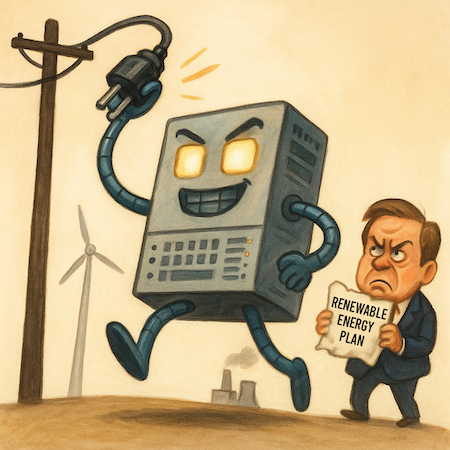- Is the climate panic over already?
- What’ll replace renewables
- AI is fragmenting power supply
For years, I’ve been wondering how politicians will back their way out of net zero. How can you back down from “the science is settled”? And demanding devastating cuts to our standard of living to save the planet? Nothing else could be more important or conclusive…
And yet, net-zero targets were blatantly impossible. We were going to run the great carbon experiment, regardless of what Western governments decreed. So, something had to give eventually…
But how could our political class possibly sell the end of the energy transition without being burned at the stake for hypocrisy?
Developed economies have spent trillions on a bridge to nowhere. We’ve incurred horrific spikes in our cost of living. Government debts are dangerously high after renewables subsidies that just keep growing. Productivity has been crushed. Industries have moved overseas. Vast investments in renewable energy projects have been sunk. Towns have been flooded by dams. Birds have been chopped up and whales beached.
You can’t just declare climate change is not actually a threat and it was all for nothing.
Can you?
Whenever I bring up this question, I get absolutely no reaction. No interlocutor was even mildly phased at the idea of the political class doing a spectacular U-turn without being held to account.
After all, they have a steady history of going on such misadventures. ESG and DEI have all but disappeared from headlines, for example.
Admittedly, the climate change movement is on another scale. But governments have always been good at finding some other emergency to worry about.
That’s why we have a democracy. To ensure nobody in government is ever held to account.
How to turn the Titanic
Sure enough, the energy transition is meeting a melodramatic ending too. Unless you’ve been mauled by one of the growing numbers of polar bears.
Yet nobody seems particularly upset about the unwinding climate change narrative…
Tony Blair now reckons renewable energy targets should be abandoned because they risk too much of a backlash. This is after declaring global efforts to cut fossil fuel consumption “doomed to fail” earlier this year.
Aren’t former Prime Ministers supposed to avoid criticising their contemporaries by stating the obvious?
Bill Gates, known for climate doom-mongering, writes that climate change isn’t actually that much of a threat after all.
This just days after receiving a letter from the US Chair of the Senate Judiciary Committee that the Gates Foundation is under investigation for channelling funds to entities connected to the Chinese Communist Party…
To be fair to Bill, his climbdown is partially based on claims that we are making reasonable progress on emissions. And that this’ll continue, somehow.
But what’s interesting is that he also admits that combating climate change has costs and trade-offs. It may not always be worth it. Perhaps we should be spending money on other things. Things the Gates Foundation has been busy with, of course.
Trump responded to Gates’ nuanced comments in style on Truth Social: “I (WE!) just won the War on the Climate Change Hoax. Bill Gates has finally admitted that he was completely WRONG on the issue. It took courage to do so, and for that we are all grateful. MAGA!!!”
I think he should take a good look at his voters’ energy bills before declaring anyone has won anything… Government misadventures are famous for leaving everyone worse off. Except for a select few “entrepreneurs”.
Blair, Trump, and Gates may be right. Governments and companies around the world are coming to similar conclusions.
Tokyo Gas has abandoned its renewables target, alongside countless other companies around the world.
The Germans are shutting down their first large commercial wind farm after just 15 years. Strangely enough, free wind energy just isn’t profitable! Even with subsidies!!!
Meanwhile, Spain’s doomed nuclear plant has applied to stay open for a few more years. LNG production is going bananas. Coal is booming. And even oil is making a major comeback.
I’ve got a prediction for you. In ten years’, time, the energy transition won’t even show up as a blip in energy statistics.
Where to next?
Here’s an innovative idea. Why not let consumer choice and cost determine our future energy mix? Instead of allowing politicians to direct things.
What if you could buy the power you wanted at the market price? What if you were “free to choose”?
Those electing the forms of baseload power that are stable and on demand would get the corresponding price and reliability.
Those who want to transition to renewables can have it.
It would get rid of a lot of the hypocrisy. And connect the consequences of people’s decisions to their own real outcomes.
Consumers do care about emissions and pollution, after all. And they’re certainly willing to vote for politicians to impose the corresponding restrictions. But then they complain about the resulting bills…
If we could simply be given the option of buying renewable energy, the energy transition would unfold at precisely the right pace. The optimal combination of how much people care and are willing to pay for renewables.
No doubt you think my idea sounds like a pipe dream. But it might already be happening….
What if the next energy revolution is already underway?
For centuries, electricity grids have been spreading across the face of the earth like a skin disease. They’ve grown ever bigger, higher, deeper, wetter, longer and more interconnected. Despite community opposition stopping plenty of projects, of course.
This rollout made sense for a lot of reasons. A bigger grid improves reliability by distributing risks. It improves robustness because isolated failures are a smaller share of an overall grid. It allows intermittent sources of energy to appear viable by allowing grid operators to assume they’ll offset each other. Despite being dependent on the same weather patterns.
But it also creates other risks. Power problems can now cascade great distances, as they did in Spain. And countries import each other’s energy policy indirectly. The Norwegian coalition government failed in January due to central European countries’ policies, for example.
What if the trend of interconnectedness is about to reverse? What if electricity production comes home?
AI data centres are increasingly securing their own off-grid power supply. As are military bases.
I’m calling it the fragmentation of the grid. People want independence from the failure of the current system.
They must be doing this for a reason. What do AI infrastructure companies know about the stability, reliability and price of power from the grid that Ed Miliband does not?
One thing’s for sure. You and I are the ones who will find out the hard way…
The companies actually rolling out AI are not going to unplug their data centres when the sun doesn’t shine. They’re far too valuable.
But who is going to capture that value? You can.
Until next time,

Nick Hubble
Editor at Large
P.S. The political class will always find a way to move on. Investors don’t have that luxury. As governments quietly reverse course on net zero, the money is already flowing toward the industries and resources that will power what comes next. Our analysts have identified where that shift is taking shape — and how private investors can position before the mainstream catches on.

